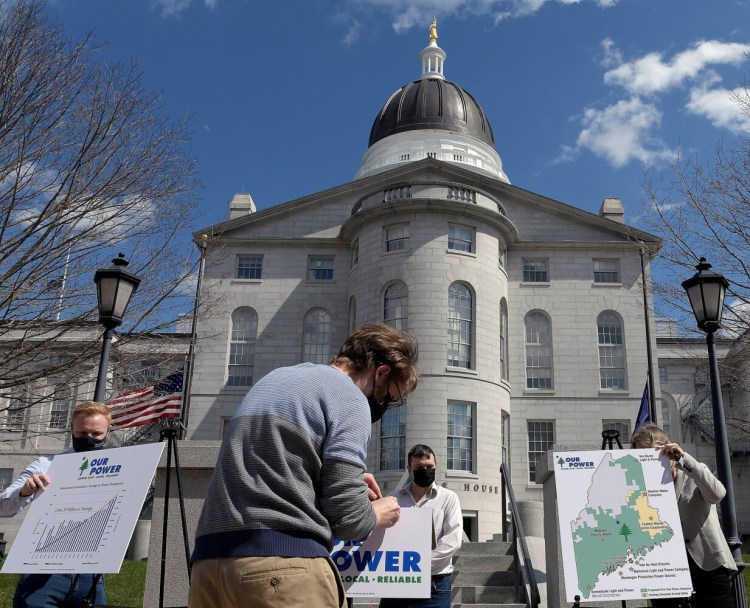A consumer-owned, nonprofit corporation would take over for electric companies Central Maine Power and Versant Power under a bill announced Monday by a bipartisan group of Maine legislators and advocates for a locally owned utility.
Foreign, for-profit corporations have mishandled the state’s electricity infrastructure, leaving Maine with some of the highest costs and lowest reliability in the United States, said Rep. Seth Berry, D-Bowdoinham, who initially proposed establishing a consumer-owned utility in 2019.
Under the proposed bill, which is not yet finalized, a consumer-owned nonprofit to be named Pine Tree Power Co. would improve service, reduce prices and help the state meet its sustainability and clean energy goals, Berry said Monday at an Augusta news conference.
“These companies have failed us,” Berry said. “Every month, the 800,000 captive customers of CMP and Versant pay monopoly rent for the use of a monopoly grid. With Pine Tree Power, we will pay a lower monthly bill. This will no longer be a rental payment, but a mortgage payment. We will save money, invest in and improve our grid, and build our own equity.”
Text of the bill is still unavailable, but Berry said it would direct the Maine Public Utilities Commission to revoke the monopoly status of the state’s two largest power distribution companies and force them to sell their assets to the new corporation. The commission’s power to revoke the companies’ monopolies already exists in state law, Berry said.
The new utility would purchase CMP and Versant assets with its own low-interest bonds, he said, adding that the proposal would not use tax dollars and would not be owned by state government. The board of directors would be elected by ratepayers and, aside from top executives, no jobs would be lost in the transition, Berry said. Operators from the private sector would be hired to manage the new utility, according to the proposal.
A representative from IBEW Local 1837, which represents about 600 CMP workers, did not respond to an interview request about the utility proposal.

Rep. Nicole Grohoski, D-Ellsworth, and Sen. Rick Bennett, R-Oxford, listen on Monday as Rep. Seth Berry, D-Bowdoinham, speaks in Augusta about legislation that would create a consumer-owned nonprofit power utility in Maine. Andy Molloy/Kennebec Journal Buy this Photo
A consumer-owned utility financed with revenue bonds would save Maine ratepayers up to $9 billion over the next 30 years, according to a 2019 London Economics International report commissioned by the state to examine the proposal. Critics have said the report overestimates the potential savings from consumer-owned power.
Advocates for the proposal, organized under the name Our Power, said Maine suffers high costs and unreliable, outage-prone service while the foreign companies that own its biggest power distribution networks function to deliver profits to their shareholders instead of benefiting the state, said Sen. Rick Bennett, a Republican from Oxford.
CMP is owned by Iberdrola, a Spanish electric company, and Versant is owned by Enmax, a Canadian company owned by the city of Calgary, Alberta.
“Right now, foreign corporations rake in billions of dollars from Maine while we are left in the dark ages, with inadequate infrastructure to serve us today, let alone tomorrow,” Bennett said.
Reacting to the news conference, CMP said any initiative to introduce “government-controlled” power “will cost Mainers a lot of money.”
“If this bill were to pass, and the state’s electric grid was seized, Mainers would be on the hook for billions of dollars … with no guarantee of improved reliability or service,” the utility said in a statement. “Creating a government-controlled electric utility would represent the largest expansion of state government in Maine’s history, and adding politics to power delivery only adds problems for customers.”
CMP spokesperson Catharine Hartnett said a report conducted for the utility by Concentric Energy Advisors found the estimated sale price of CMP and Versant together would be $11 billion in 2024 and $13.5 billion in 2030, assuming the normal pace of grid upgrades.
Nearly 100 Maine communities already get their power from consumer-owned utilities such as Kennebunk Light and Power, Madison Electric Works and Eastern Maine Electric Collaborative. Those utilities regularly have lower costs, better customer service and are more reliable than either CMP or Versant, said Rep. Nicole Grohoski, D-Ellsworth.
Those utilities “aren’t managed by magicians,” Grohoski said. “Without a mandate to earn income for shareholders, they can invest any (surplus cash) right back into their systems. They can access low-cost capital through revenue bonds to make infrastructure upgrades. And they are managed locally and transparently, by our friends and neighbors. They really do have our best interests in mind.”
The London Economics report concluded that switching to a consumer-owned utility would increase ratepayer costs in the short term, but that Maine customers would realize savings over time.
The report also cautioned that state and local governments could lose tax revenue by switching to a nonprofit model. Pine Tree Power Co. would pay fees to local governments instead of taxes under the current proposal.
The idea of creating a locally owned utility to take over from the state’s largest power companies has come up before, but it has gained momentum in recent years amid plunging consumer confidence in CMP after a botched rollout of its new billing system provoked public outrage and fierce opposition to construction of a power transmission line through Western Maine woodlands.
The two power companies have said they would oppose any consumer takeover attempt. Berry said Monday that the bill would hold up if challenged in court.
Correction: This story was updated Tuesday April 20, 2021, at 4:40 p.m. to correct a misstatement by CMP about the estimated market value of the two utilities.
Send questions/comments to the editors.




Comments are no longer available on this story